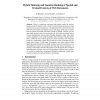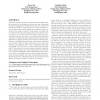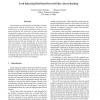69 search results - page 7 / 14 » Compressed Inverted Indexes for In-Memory Search Engines |
WWW
2003
ACM
14 years 8 months ago
2003
ACM
Recent work on incremental crawling has enabled the indexed document collection of a search engine to be more synchronized with the changing World Wide Web. However, this synchron...
DEXA
2010
Springer
13 years 4 months ago
2010
Springer
Abstract. There is a significant commercial and research interest in locationbased web search engines. Given a number of search keywords and one or more locations that a user is in...
CPM
2010
Springer
14 years 8 days ago
2010
Springer
The field of compressed data structures seeks to achieve fast search time, but using a compressed representation, ideally requiring less space than that occupied by the original i...
SIGIR
2011
ACM
12 years 10 months ago
2011
ACM
Versioned textual collections are collections that retain multiple versions of a document as it evolves over time. Important large-scale examples are Wikipedia and the web collect...
PDP
2008
IEEE
14 years 1 months ago
2008
IEEE
Search engines use inverted files as index data structures to speed up the solution of user queries. The index is distributed on a set of processors forming a cluster of computer...



